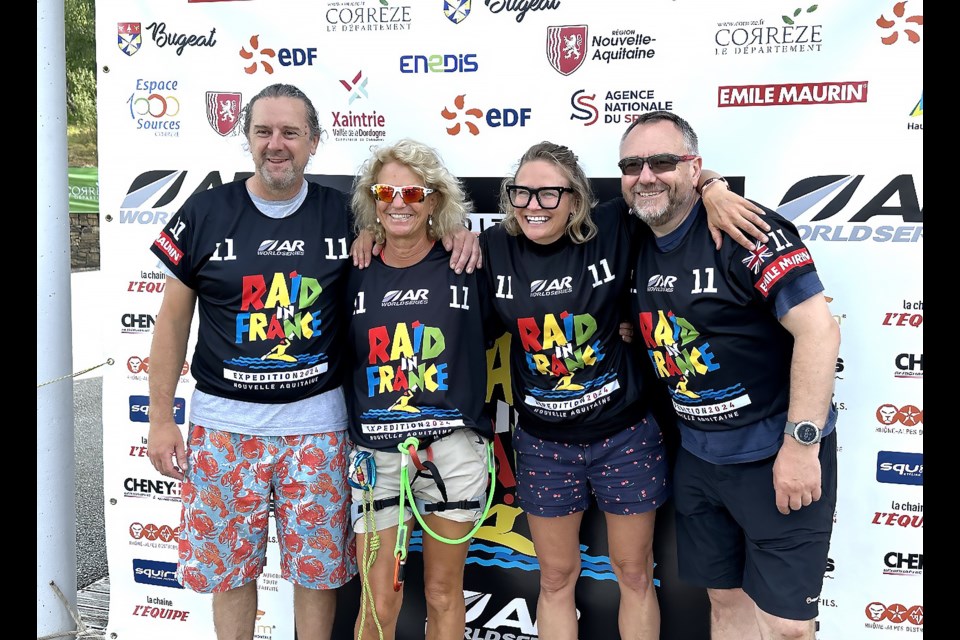FRANCE – The sun has set and Canmore’s Debbie Harksen’s beginning to climb through a canyon with more than 40 pounds of gear on her back. Sleep deprivation is setting in and she has had a low-calorie intake.
Nearing six hours later, Harksen and her three teammates made it out of the canyon section part of a near 600 kilometre expedition race in the Novelle-Aquitaine region of France.
“It's as much of an expedition as it is a race, still a race, but you're always trying to preserve yourself for the next section," said Harksen.
The canyon was one of 13 sections that Harksen had to endure with others involving packrafting, mountain biking, hiking and canoeing. All the while her team, the Nav4 Thrash Pigs, had to navigate the French wilderness with orienteering maps.
“The maps are always a challenge … some trails are on them, some trails aren't. There’s circles and drawings on it that might cover up some of the detail that you need to find where you're going,” said Harksen.
“Sleep monsters” were also a factor when it came to enduring the challenges.
“We’re definitely at one point hallucinating, and I thought I'd seen this large, white squirrel go across and they're like, ‘I guarantee that wasn't there,’” said Harksen. “This makes navigation really difficult when you start having a sleep monster because your brain is not quite working.”
Her team was averaging one to two hours of sleep in their seven-day journey.
“This is a non-stop race, so sleeping is part of the race. Generally, we’re keeping it to one to two hours a night,” she said.
The added fatigue and difficulty of the adventure led to two major mistakes going off trail and biking an unnecessary mountain.
“We made one really long and horrendous wrong turn we came out of the transition on the bike, and we pretty much climbed a mountain on our bike, only to realize we'd gone up the wrong way,” said Harksen.
The second major flaw in their race came from a missed turn that took them down a valley and back out for around six hours.
“It was one of these mistakes that just cost so much energy, so much time, that mentally it can be hard to come back from,” said Harksen.
The detours racked up the kms, putting their total around the 600 km mark, with more than 10,000 metres of elevation gain by the time they crossed the finish line.
Through Harksen’s experience, singing a song, laughing and lots of chit chat had brought the team back together despite the wrong turns, low moments and lack of sleep.
Harksen is already planning her mental mixtape to sing for the next expedition in the Yukon River Quest next year.
“When you're falling asleep on a paddle in the middle of the night, [there’s] nothing better than song. I think that's definitely an important role,” Harksen said.
The team ate when they could with a most calories coming from energy bars and chips. Harksen cracked a few cans of Red Bull and downed caffeine pills to keep her going.
“Every time there's a chance to go to a village we will try and stock up on croissants,” said Harksen. “We did bring a Jetboil and in a couple of the transition zones, we had a cup of noodles and dehydrated meals.”
The team of four crossed the line as three after one of their teammates got sick from the water in the “valley of 1,000 cows.”
At the time it even caused doubt among the team if they’d continue.
“Some things you know, are dangerous topics of conversation. Someone will say something like, ‘we could be doing this if we weren't in the race,’” said Harksen, who’s quick to snuff out those conversations.
“I've also learned we just can't even entertain those kinds of conversations or let them start because they represent a danger to your chance of finishing.”
Coming into the finish line, with the winning team cheering them on, Harksen and her teammates got teary-eyed.
“I looked at [my teammates] in the eye, and we all got tears immediately,” she said.
The moment was especially important for Harksen and Carin Goldblatt as they raced together in 2018 but couldn’t finish.
“After you share this kind of experience with your teammates, it's a kind of bond that it's just unmatched by any other type of event,” Harksen said.




